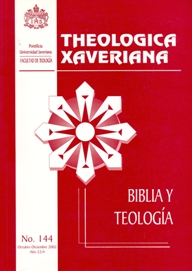Abstract
Este artículo pretende señalar algunos de los caminos trazados por la hermenéutica bíblica feminista. Parte de ciertos datos sobre el feminismo para señalar cómo sus demandas han influido en diversos ámbitos de la realidad, incluido el teológico. En él, la teología feminista ha reconocido la centralidad de la Biblia y, por tanto, la necesidad de la hermenéutica bíblica feminista. Ésta ha tenido varios desarrollos. Pueden señalarse, entre otros, la exégesis crítica de aquellos textos sobre la mujer que han favorecido más su subordinación, la recuperación de textos olvidados que aportan otra visión sobre la mujer, la búsqueda de una perspectiva teológica general desde la cual criticar el patriarcado, la recuperación de los silencios y las ausencias femeninas en la Biblia y la reconstrucción de la historia de las antepasadas bíblicas. Tales caminos ya han dado sus frutos positivos, al mostrar un mayor protagonismo de la mujer en la Sagrada Escritura y denunciar todos aquellos textos que pueden legitimar su subordinación. Sin embargo, la tarea es todavía muy grande, en especial, en la concientización de que un trabajo hermenéutico que hoy en día olvide esta perspectiva no responde a los retos actuales ni al imperativo evangélico de una comunidad de iguales.This journal is registered under a Creative Commons Attribution 4.0 International Public License. Thus, this work may be reproduced, distributed, and publicly shared in digital format, as long as the names of the authors and Pontificia Universidad Javeriana are acknowledged. Others are allowed to quote, adapt, transform, auto-archive, republish, and create based on this material, for any purpose (even commercial ones), provided the authorship is duly acknowledged, a link to the original work is provided, and it is specified if changes have been made. Pontificia Universidad Javeriana does not hold the rights of published works and the authors are solely responsible for the contents of their works; they keep the moral, intellectual, privacy, and publicity rights.
Approving the intervention of the work (review, copy-editing, translation, layout) and the following outreach, are granted through an use license and not through an assignment of rights. This means the journal and Pontificia Universidad Javeriana cannot be held responsible for any ethical malpractice by the authors. As a consequence of the protection granted by the use license, the journal is not required to publish recantations or modify information already published, unless the errata stems from the editorial management process. Publishing contents in this journal does not generate royalties for contributors.


